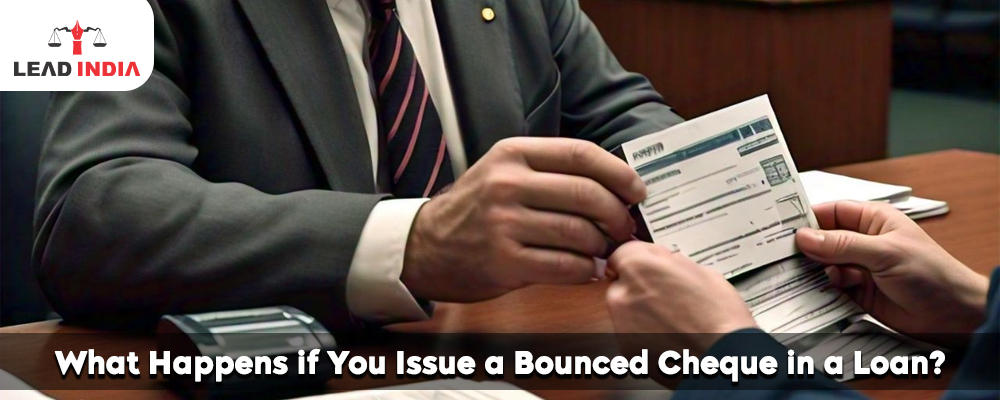A bounced cheque which is sometimes referred to as a dishonour cheque arises when a bank does not honour a request to pay through a cheque owing to inadequate account funds or some other internal issues. This simply means that the account holder has issued a cheque that exceeds the funds available in their checking account. This action poses serious risks for a debtor in that state- regardless of the amount owing to them, it is automatically consider a crime.
Legal Consequences of Issuing a Bounced Cheque in a Loan
The penalties imposed in cases of issuing bounced cheques vary across places, though they are normally more stringent in cases involving creditors. The legal consequences are as follows:
Criminal Prosecution
In several nations it is illegal to issue a cheque without having enough money in the account especially if it is in relation to a loan. In situations where the offender is find guilty, the issuer may be subject to criminal penalties such as fines or jail term. The courts normally appreciate this as a trust violation or even fraud if there was a plan to hoodwink the lender.
Need A Legal Advice
The internet is not a lawyer and neither are you. Talk to a real lawyer about your legal issue

Penalty Under Negotiable Instruments Act
In India, there exists Section 138 of the Negotiable Instrument Act, 1881 which deals with the dishonour of cheques. Notably also provides that where a cheque is return unpaid on grounds that there are no sufficient funds to honour the payment, the drawer of that cheque shall forfeit, among other penalties, a fine or a term of imprisonment not exceeding two years depending on the specific circumstances of the case.
Civil Lawsuits
In addition to the civil actions, any worse action such as a petition brought by the lenders will also apply. This could mean that the borrower in question will have to pay some more money other than the loan borrowed inclusive of legal cost and interest incurred as well as any other penalties.
Warrant Issuance
In circumstances where the drawee of a cheque has not responded to a demand letter or court’s summons regarding the bounced cheque, the court may initiate an arrest warrant. When a default on the repayment of a loan is repeatedly ignore, and other legal action remedies are insufficient, an arrest warrant can be obtain.
Financial Impact of a Bounced Cheque
- Charges and Fines from the Bank: Most banks impose warning fees on the check issuer whenever a cheque is dishonour. Aside from this, the payee’s bank may also charge some fees for the process of solving the issue of a cheque that is dishonour. Eventually, these costs spiral upwards, most especially in instances where the cheque writer has written a number of different cheques.
- Increased Costs of Borrowing: Most lenders raise the costs of borrowing in case the repayments are not make on time, or if a certain check is return, which is why they view it as a risk to their assets. This in turn means that the amount the borrower is scheming to borrow is less than what he/she will eventually pay to settle those loans.
- Repayment status on loans due: In the event of an insufficient funds cheque that delays repayment by the borrower, the lender can decide that the loan is in default. A default on a loan results in termination of that loan, that is, all the remaining balance is demand from the borrower at once.
- Repossessing collateralized asset: Collateralized loans (such as loans backed by real estate, vehicles, or any other assets) shall allow the lender to take over the asset in question and/or sell it off in order to retrieve the funds lent.
- Terms of Collection and Recovery due to the Loan: It is quite common for lenders to put loan recovery agents or collection agencies into use for retrieving the sum owed. Such scenarios can worsen the situation causing frequent harassment by more collection calls, undue pressure and a tarnished credit score.
Preventive Measures
- Ensure Sufficient Fund: This is perhaps the most apparent yet the most essential and effective precaution. As far as the issuance of any cheques by the borrowers is concerned, they should make it a point that they possess additional funds in their bank accounts to take care of the entire cheque amount while considering the impact of any fees or deductions on the account balance.
- Use Electronic Transfers When Possible: A lot of the new age banking systems also have the option of wire transfers which allow the customers to make payments within minutes. Payments made through this method are less hassle compare to paying using cheques. In addition, there is likely to be documentation supporting the transactions.
- Communicate with Lenders: When any borrower thinks that making the next scheduled payment will be a problem they should give the lender a head up as soon as possible. Many lenders will resent payments restructuring an income but only when the borrower notifies his need rather earlier.
Issuing a cheque that bounces back in the course of receiving a loan brings about a number of effects that could be affix and they could be legal battles and financial obligations or even social and psychological aftermaths. Legal sanctions may be the short-term consequence of such an action, however the longer term consequences are the legal reputation damage, psychological issues and even the withdrawal of a number of connections from the individual. Knowing the possible results and taking measures against them can help avoid these issues and keep one’s finances and reputation intact.
One can talk to a lawyer from Lead India for any kind of legal support. In India, free legal advice online can be obtain at Lead India. Along with receiving free legal advice online, one can also ask questions to the experts online free through Lead India.





 Talk to a Lawyer
Talk to a Lawyer